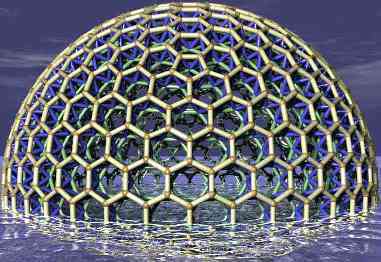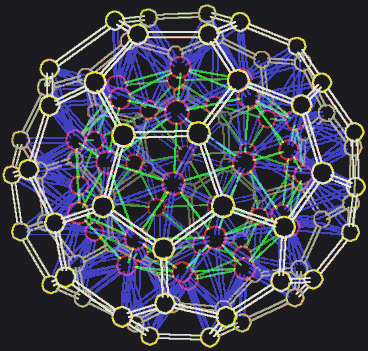
HexDome
Hexagonal Geodesic Domes - Simulator
Springie
Note: a vastly improved distant descendant of this program
is now available from http://springie.com/.
Tensegrity Simulator
To assist visualising the type of dome under discussion
on this web site, we've written a simulator, capable of
rendering multi-layer geodesic domes:

Tensegrity Simulator
The program simulates the physics of mass-compression-tension
structures - and allows them to be mainpulated interactively
in real time from within a browser window.
A number of structures are available to view - including
some "hexagonal" domes - and some conventional geodesic
structures.
These can be distorted and smashed up - a process which
gives some idea of the stability of the structures.
System requirements
This is a Java program. It needs Java 1.1 or better.
The program also appreciates high resolution displays -
so please open your browser window as big as you can.
Dome viewer
Use one of the following links to run the program:
Brief instructions
Click with the left button to select nodes - and drag them around.
Click with the right button to delete nodes.
Editing system
The dome simulator seen here is part of a much more complex and
sophisticated dome construction and editing system.
I recommend users try the viewer before trying the editor.
The system allows domes to be "grown". This operation
proceeds by dynamically inflating large balloons until they
touch each other - and then allowing them to apply pressure
to their neighbours. The balloons are then deflated - and
form the nodes of the resulting structure.
This process naturally allows construction of irregular
domes - as well as regular ones.
You can try the editor using the links below:
Unfortunately, while some elements are self-explanatory,
there are not any instructions for the editor at this
stage.
Aims
A physics simulation seems needed to address some
currently-unresolved questions about these sorts of domes.
As a brief summary:
- Optimal shape
In theory, the hexagonal structural framework of
these domes should be self-supporting (though unstable) -
and the stabilising framework should not need to perform any
real work - unless the structure is perturbed.
However - the shape of the dome and the length of the struts
has to be exactly correct for this situation to
arise.
- Gravitational stress
Many domes exist in strong gravitational fields - and
the resulting forces may affect the geometry and design of
the dome - by concentrating structural materials in the
lower, weight-bearing regions of the dome. Simulation
should help throw light on this issue.
- Material properties
Lastly, I hope such
simulations will be capable of a certain degree of stress-
testing, give some clues about the required properties of
the materials involved in constructing physical domes.
Source code
Source code is available here.
License
This page - and the program it describes - has been placed
in the public domain by its author.
Tim Tyler |
Contact |
http://hexdome.com/
|